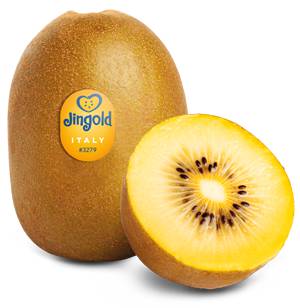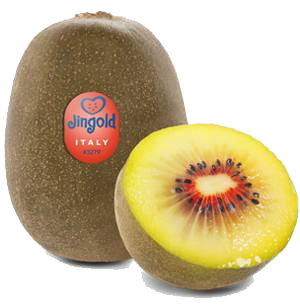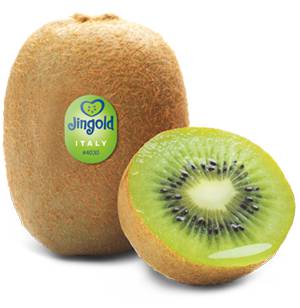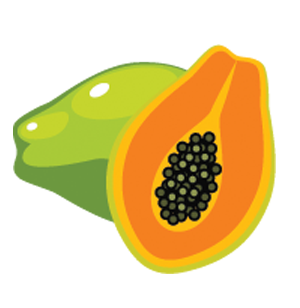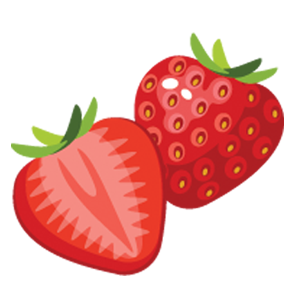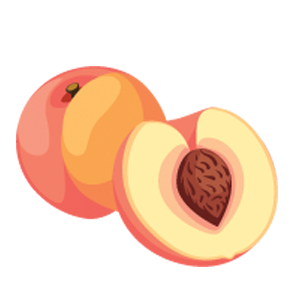THE BENEFITS OF KIWI
Contents:
1. Kiwi, for centuries a friend to humans
2. Kiwi: more than the usual fruit
3. Nutritional properties of kiwi
4. Benefits for health
1. Kiwi, for centuries a friend to humans
The benefits of the nutrients of the Actinidia deliciosa were already well-known by the Chinese population living in the valleys of the YangTze, the Blue River, many centuries ago.
Nutritional Science still did not exist, but the wise Chinese people of the Fifteenth century were already aware of the significant health properties of the plant we call kiwi today, just like the bird in New Zealand, the land that, in the early Twentieth century, began to cultivating the Chinese berry.
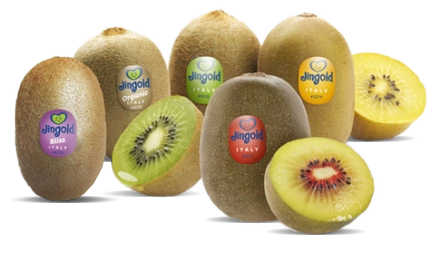
2. Kiwi: more than the usual fruit
Compared to other fruits, the green kiwi has unique characteristics for the variety and the quantity of nutrients it contains: vitamins, proteins, minerals, anti-oxidants and fibres. It also contains little fructose (the sugar in fruit) and only 44 calories (kcal) per 100 g. A Golden Delicious apple contains 46.
- Considering that the recommended quantity of fruit daily for every adult is, on average, approximately 450 g, just one 150 g serving of kiwi can abundantly satisfy the daily requirements of vitamin C according to the NRV* indexes and it can contribute to reaching requirements for many other important nutrients, like dietary fibre.
| Green Kiwi – Average values for 100 g of product | |
|---|---|
| Energy (calories) | 44 kcal |
| Proteins | 1,2 g |
| Fats | 0,6 g |
| Total carbohydrates | 9 g |
| Fibres | 2,2 g |
| Potassium | 400 mg |
| Phosphorous | 70 mg |
| Iron | 0,5 mg |
| Vitamin C | 85 mg |
| Niacin (vit. B3) | 0,4 mg |
| Vitamin B6 | 0,15 mg |
| Folic acid (vit. B9) | 25 μg |
| Vitamin E | 1,46 mg |
| Vitamin K | 40,30 µg |
Source: AR (Reference intake for an average diet of 2000 kcal daily), NRV* (Nutritional Reference Values for an average diet of 2000 kcal daily) EFSA 2019.
3. Nutritional properties of kiwi
Regarding macro-nutrients:
- Among the significant proteins content found in kiwi, actinidine and kiwellin are characterised by a high bioactive potential, since they are rich in cysteine (one of the essential “blocks” for the synthesis of proteins).
- Let’s remember that the fat from kiwi pulp is 55% polyunsaturated, among which is alpha-linolenic acid (ALA) an essential fat precursor of omega 3. Kiwi seed oil is, in fact, rich in omega 3. Additionally, regarding the seeds (of fruit and vegetables) the belief is that they can worsen intestinal illnesses like diverticula. This belief leads many people to give up on the valuable benefits of fruit and vegetables but, actually, seeds are not harmful, as scientific research has demonstrated.
Regarding micro-nutrients:
- The fibres content (soluble and insoluble) of kiwi is higher than most other fruits. The fibre is susceptible to fermentation and it is the precursor of short-chain fatty acids, particularly beneficial for intestinal health. The fibre in kiwi is also known for its prebiotic properties, since it stimulates intestinal motility, increasing a feeling of fullness, contributing to improved digestion and to the health of the intestinal microbiota.
- Kiwi is a high source of vitamin C: 100 grams of green kiwi contain 85 mg of vitamin C, covering 100%* of the daily requirement of an adult. As the table below shows, kiwi is the fruit that contains the greatest quantity of this important vitamin among those most consumed, like citrus fruits or strawberries, contrary to what is often believed. Furthermore, different studies have observed that eating 4 kiwi a day for 4 weeks increases plasmatic concentrations of vitamin C, α-tocopherols and lutein/zeaxanthin, as well as concentrations of folates in red blood cells.
- Finally, kiwi contain vitamin E (α-tocopherols) and folic acid (vitamin B9), which is very important for pregnant women, providing approximately 10% of the daily intake requirement.
- Kiwi also contains many minerals, among which is 400 mg of potassium, more than what is contained in bananas, 350 mg.
4. Benefits for health
A healthy and balanced diet includes eating fresh fruit every day. It is therefore beneficial to eat a serving of kiwi (150g) each day, varying the type (green, gold and red) and alternating them with other seasonal fruits. The always more numerous studies on this fruit have increased awareness on the benefits of kiwi for human health and provided strong motivation for their regular consumption as part of a balanced diet.
- Anti-oxidant activity: kiwi are rich in anti-oxidants, substances that help our body eliminate free radicals, as well as to reduce the peroxidation of lipids in the body, thus reducing oxidative stress and contrasting cellular ageing. This can protect the body from inflammations and illnesses.
- Anti-diabetic activity: different studies have proved that kiwi extract can inhibit α-amylase and α-glucosidase, key enzymes for the absorption of food sugars. Additionally, a significant contrasting action was also observed to the processes of protein glycation (decrease in glycated haemoglobin).
- Anti-inflammatory activity: thanks to the content of vitamins and polyphenols, kiwi sustain the correct response to contrast the inflammatory activity promoted by the LPS bacteria (a type of bacteria) and by pro-inflammatory cytokines (that contribute to the proliferation process of cells involved in the inflammatory and immune processes of the body).
- Anti-cholinergic activity: flavonoids, phenolic acids and anthocyanins of the kiwi are able to inhibit the acetylcholinesterase, recommending that the intake of kiwi can be significant in the protection against oxidative stress typically present in neurodegenerative diseases.
- Health of the skin: several studies have proved that kiwi extract contrasts atopic dermatitis based on the significant reduction of the seriousness of the dermatitis, of the epidermic thickness, of the infiltration and degranulation of the mast cells in the dermis.
- Cardiovascular protection: a regular consumption of kiwi helps to maintain a correct blood pressure, reducing the risk of stroke and heart disease. Fibre intake from the consumption of two kiwi a day helps to reduce the risk factors for heart disease, lowering bad cholesterol (LDL).
- Correct microbiota: eating kiwi regularly contributes to maintaining a correct intestinal microbiotic ecosystem (or microbiota), facilitating the trophism of bacteria beneficial to the colon (Bifidobacterium spp. and Bacteroides spp.), increasing their number, as well as the production of short chain fatty acids, to protect the intestinal cells. The pectins contained in the fibre of kiwi have proved to have a prebiotic action.
- Against constipation: kiwi contain a high quantity of dietary fibres. The fibre can help to reduce constipation and a variety of other problems and gastrointestinal issues. Particularly well-known are the benefits of kiwi at breakfast: eating two kiwi immediately after the night time fasting can help bowel movements.
- Treatment of asthma: the abundance of vitamin C in kiwi was associated with a reduction in the symptoms of hissing for several asthma patients. This is particularly true for children, who seem to benefit the most from eating kiwi.
- Eye health: if eaten with other healthy fruit and vegetables rich in vitamins and minerals, the high levels of anti-oxidant and carotenoids found in kiwi can help to prevent eye illness and promote general eye health.
- Anti-fatigue remedy: like all fruits, kiwi too contains sugars, essential for good physical performance. Nonetheless, the common presence of vitamins and anti-oxidants favours resistance to prolonged physical effort, improving therefore athletic performance.
Scientific collaboration: Dott.ssa Raffaella Cancello, Nutritional Researcher, Department of Medical Sciences and Rehabilitation specialised in endocrine-metabolic disorders, Research Laboratory in Nutrition and Obesity, IRCCS-Istituto Auxologico Italiano (Scientific Institute for Research, Hospitalization and Health Care), Milan
Published works: https://pubmed.ncbi.nlm.nih.gov/?term=Raffaella+Cancello
Essential bibliography:
- Wilson R, Willis J, Gearry RB, Hughes A, Lawley B, Skidmore P, Frampton C, Fleming E, Anderson A, Jones L, Tannock GW, Carr AC. SunGold Kiwifruit Supplementation of Individuals with Prediabetes Alters Gut Microbiota and Improves Vitamin C Status, Anthropometric and Clinical Markers. Nutrients. 2018 Jul 12;10(7):895. doi: 10.3390/nu10070895. PMID: 30002355; PMCID: PMC6073280.
- Mishra S, Edwards H, Hedderley D, Podd J, Monro J (2017) Kiwifruit non-sugar components reduce glycaemic response to co-ingested cereal in humans. Nutrients. https://doi.org/10.3390/nu9111195
- Rush E, Drummond LN (2009) The glycaemic index of kiwifruit. N Z Kiwifruit J 192(May/June):29–33
- Monro J, Bentley-Hewitt K, Mishra S. Kiwifruit Exchanges for Increased Nutrient Richness with Little Effect on Carbohydrate Intake, Glycaemic Impact, or Insulin Response. Nutrients. 2018 Nov 8;10(11):1710. doi: 10.3390/nu10111710. PMID: 30413045; PMCID: PMC6265741.
- Monro JA. Kiwifruit, carbohydrate availability, and the glycemic response. Adv Food Nutr Res. 2013;68:257-71. doi: 10.1016/B978-0-12-394294-4.00014-6. PMID: 23394992.

